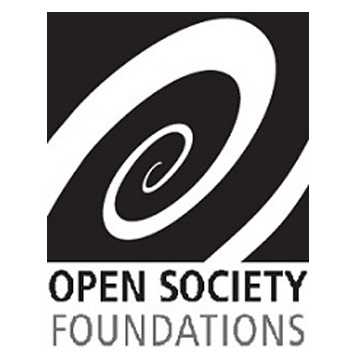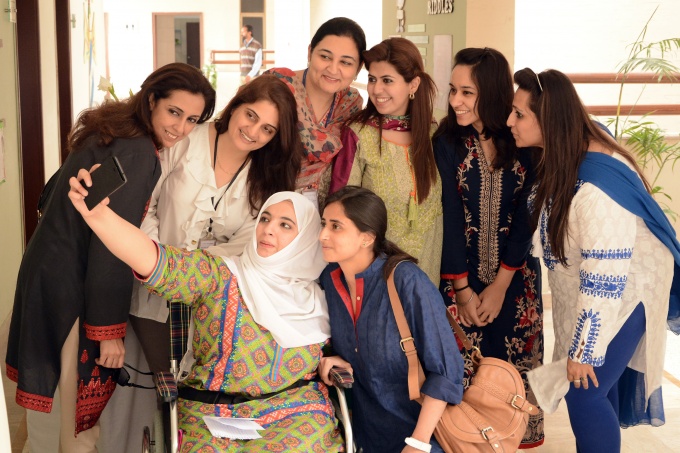NEWS
March 28, 2018

IN BRIEF
Disabled people face many barriers in Pakistan—not just physical ones. Jessica Holzer Even if they can navigate cities without ramps or elevators for those in wheelchairs, they still need to overcome deep prejudices that keep disabled people from becoming full members of society. Those who dare to venture outside their home are routinely met with stares or are approached by strangers who ask them to pray on their behalf. In rural areas, where disability is seen as a bad omen or curse from god, blind and crippled people are mocked. Ashamed parents keep disabled children shut inside and feed them [...]
SHARE
Disabled people face many barriers in Pakistan—not just physical ones.
Jessica Holzer
Even if they can navigate cities without ramps or elevators for those in wheelchairs, they still need to overcome deep prejudices that keep disabled people from becoming full members of society.
Those who dare to venture outside their home are routinely met with stares or are approached by strangers who ask them to pray on their behalf. In rural areas, where disability is seen as a bad omen or curse from god, blind and crippled people are mocked. Ashamed parents keep disabled children shut inside and feed them poorly.
“Even in the most educated circles, people are just too dumbfounded to talk to me. They don’t know what to talk to me about,” says Tanzila Khan, a wheelchair user and social entrepreneur from Lahore who has been disabled since birth.
 Despite her disability, Ms. Khan counts herself lucky as she’s been spared the worst treatment. She has also been encouraged by her family and friends to lead a normal life. At age nine, a charity paid for
Despite her disability, Ms. Khan counts herself lucky as she’s been spared the worst treatment. She has also been encouraged by her family and friends to lead a normal life. At age nine, a charity paid for
her to fly to the United States for medical treatment. They removed some weaker bones and gave her artificial prosthetics to help her walk. But the biggest change was psychological: she experienced “a world where there were ramps and people were friendly.”
Now at 27, Ms. Khan is trying to make her own society more open. A Monopoly player since childhood, Ms. Khan is adapting the board game to teach people that everyone in society should be held accountable for how disabled people are treated. Her trip to the United States “inspired me to want a world like that for Pakistan and South Asia,” she says.
Ms. Khan’s game features a city called Accessibility Town, or “A-Town,” where all the properties and spaces pose problems for different types of people: a print shop lacks ramps, a school has a discriminatory admissions policy, a municipal office doesn’t have interpreters. Each player is assigned a disability, which isn’t known to the other players.
Like in Monopoly, players buy up properties and try to improve them in order to get rich and bankrupt the other players. But in A-Town, players are rewarded for making their properties more accessible. For example, a blind player who lands on a restaurant that offers menus in brail has to spend money there. A renter who builds a ramp for his apartment building sees his rent go down.
The game uses role play to help people experience disability and decision-making power at the same time. The hope is that they become motivated in their real life to demand more accessible spaces and fairer and more humane treatment for disabled people, Ms. Khan says. “The whole idea is to get people to realize that everyone is accountable to make sure the policies, the buildings, and the services and products are all available to the wide range of people,” she explains.
Ms. Khan is about to wrap up testing of game prototypes and is now courting investors. But she faces challenges. Pakistan has barely any startup ecosystem. The business culture is risk averse, chauvinistic, and favors experience over youth. A 27-year-old disabled female entrepreneur? It’s practically unheard of. “Being a young person starting a business is really risky, especially if you’re a woman and you have a disability,” Ms. Khan said.
The hostile climate has been eased to a great extent by Ms. Khan’s participation in the Accountability Lab’s incubator in Pakistan, which supports young people with creative ideas for accountability. The incubator provides “accountapreneurs” with hands-on training, mentorship, and networking assistance. It also gives participants access to a community of likeminded social entrepreneurs who are eager to collaborate and share resources.
Ms. Khan’s kinship with the other accountapreneurs has been priceless. “Even if I called them at 3:00 AM to ask for their help, I think they would jump right in,” she says.
Ms. Khan received $2,500 in seed funding from the incubator, which has covered some living expenses as well as her market research and prototyping costs. But she needs more capital to hire a designer and begin to manufacture and market the game. Once it is made, she plans to travel around the country and introduce the game in schools. “We need to educate the buyer before they even purchase the product,” she says.
The Accountability Lab’s incubator recognizes that no matter their age, innovators like Ms. Khan have so much to offer their communities. If international donors want to see civil society improve in places like Pakistan, they must support young people with the financial and professional resources to accomplish their goals.
